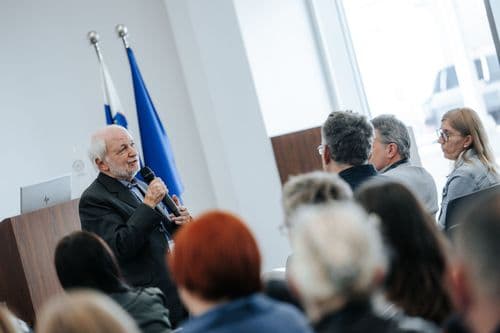Lecture on Undesirable Barriers to Access to Archives in Ljubljana
Iván Székely, Chief Consellor at the Archivum, was invited to the annual conference of the Archival Society of Slovenia, which was held in Ljubljana, in the new building of the National Archives, on the occasion of the 80th anniversary of the Slovenian National Archives, on the topic of access to archives. Iván spoke about the still existing, undesirable barriers in the light of the new pan-European study by the Council of Europe, of which he was the professional leader.
The political and social changes around 1989 awakened the need to lift administrative secrecy, share information power, and provide a kind of information restitution for both individuals and society as a whole. Charles Kecskeméti, who was born in Hungary and left the country during the 1956 revolution, spent most of his life in France and, as Secretary General of the ICA, became a leading figure in international archival life. He was the main driving force behind the establishment of international standards for free access to archives. On his initiative, following numerous bilateral professional negotiations, the Council of Europe, the largest European intergovernmental organization whose mandate is to promote human rights, democracy and the rule of law, adopted a recommendation on a European policy on access to archives in 2000 after lengthy consultations. Iván was Charles Kecskeméti’s partner in this work.
Right after the Recommendation was adopted, Kecskeméti initiated a Europe-wide investigation to determine whether the member states of the Council of Europe were complying with the Recommendation. The investigation was conducted by the OSA, led by Iván. The findings of the investigation are contained in the CoE's Handbook on Access to Archives, published in English and French, which reveals that it was not only the new democracies that were deficient in providing access, but also some of the traditional old democracies in certain areas.
Twenty years later, the CoE wanted to see if there had been any changes in the accessibility of archives in the meantime. The new study was conducted under Iván's professional leadership, with the collaboration of colleagues from the German Fraunhofer ISI institute. The main conclusion was that although the overall situation is much better than it was 20 years ago, there are still persistent barriers that researchers face today. Iván spoke to Slovenian archivists about these barriers.
He identified two types of barriers: an example of legal barriers is when access to archives is not defined as a right in a country's national law, so users must apply for it and can obtain it as a privilege. Perhaps the most frustrating practical barrier is when an archive can refuse to release a document if it deems that it is not relevant to the user's research topic.
The more than 120 participants asked numerous questions on the topic and gained new insights into the Blinken OSA Archivum and its parent institution, the Central European University, too.
